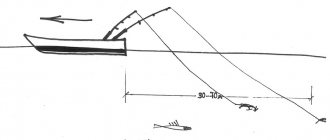About trolling
()
Trolling and hating - Oksana Moroz / PostNauka
Trolling
(comes from the English
trolling
- fishing with a lure or from the Russian-language deformation of the word
troll (trawl)
, which means bullying) - an activity on the Internet consisting of posting provocative messages, the purpose of which may be to attract attention, respond to flooding, flame, extract lulz , offtopics, conflicts and so on. A person who engages in trolling is a troll. Previously, provocative messages themselves were also called the same, the very name of which is associated with a mythical creature. Trolling can be perceived as bullying, but it has two main differences from it: 1) it contains common sense and its main goal is to deceive the public into flooding and extract lulz from it; 2) trolling is aimed at an indefinite number of the public, while bullying has the goal of humiliating a specific person(s).
First used in its current meaning on Usenet when user "Mark Miller" addressed user "Tad" as such on February 8, 1990.
Recently, accusations of trolling have become very popular on Wikipedia. They are usually used by administrators to block participants they do not like in a situation where they do not commit obvious violations of the rules. Administrators theorize a lot about trolls, and describe them using terminology from 1937 - “a troll is hiding,” “recognize a troll,” etc.
[edit] Action Arena
()
Philip Kirkorov - Trolling Paranoid Troll
A wide variety of Internet projects (except for pupated ones and those in BAO):
- Forums;
- Some news sites and media where commenting is possible;
- Chats;
- Social media;
- Wikimedia;
- Blogs, communities of bloggers;
- Imageboards;
- Skypochats;
- PR projects;
- Freebie storage services (where you can leave comments);
- Other Web 2.0 projects.
Who is this
Well, you should now have a rough idea of who an Internet troll is.
Firstly, this is most likely a fake page, where exact data is not indicated: no full name, no true place of residence, fake friends. Only subscriptions and groups can indicate the exciting topics of this profile.
Secondly, this is an inadequate person, possibly with mental illness, who can increase his self-esteem by insulting and humiliating other people.
This could be an outcast schoolboy who, for some reason, was not accepted by his peers. An adult who wants to boost his ego on social networks can also act as a troll.
Initially, trolls simply existed and satisfied some of their needs that were incomprehensible to adequate people. Currently, a type of paid trolling has emerged, so to speak, “to order.” More on this below.
[edit] Types of trolling
Not to be confused with the inhabitants of the forests of Norway!
thin trolling stands out
(well-prepared, successful, which ultimately brought satisfaction to the troll and extracted a lot of lulz) and
thick
(trolling, which is performed at a low, stupid, primitive level, delivers lulz only to the troll himself and is more like baiting than extracting lulz).
The classification of trolling is as follows:
- Throwing in
rumors, slander, compromising evidence. It is widespread in the blogosphere, as well as on sites for downloading freebies or shareware programs. - Impersonating
:
a girl
(sending romantic invitations or scamming feminists/lesbians), - inadequate
(all messages are written in caps, the messages contain complete stupidity), - a foreigner
(writing questions in a foreign language, demonstrating a lack of understanding of what your interlocutors are trying to answer), - celebrity
(in this case questions and mistrust begin, but depending on what kind of celebrity you pretend to be), - “your person” (in this case, the troll usually registers under a name corresponding to the topic of the forum and selects an appropriate avatar for himself). For example, there are common cases when a troll, registering on an Islamic or Caucasian forum, chooses appropriate names and avatars for himself. But after a while he betrays himself with insults towards other users.
- K.O.
(demonstrating oneself as the smartest, refuting the words of one’s interlocutors, supporting one’s refutations with Google or Wikipedia),
(an image is created of a handsome/rich/smart, etc. person who has already achieved great heights in life - while those around him feel envy and show their indignation),
(distributing supposedly psychological consultations to different people - what is best to do, what to treat, where to turn, etc.)
Distributed on forums, chats, social networks, etc.
- Hitting
a psychopath is provoking a potential inadequate user in order to provoke a completely expected reaction: either the beginning of a massacre on the forum where he lives, or the appointment of a showdown in real life (in the event that the troll allegedly reports that he lives in the same city with a psychopath ). - IT trolling
- at the beginning, a question is asked about help on some forum related to IT. Then, in response to the responses received, you say that this is nonsense and call their authors lamer. - Political
- a scam to troll members of some political communities, patriots, Nazis, etc. An example is throwing into a political forum the topic that Crimea belongs to Russia (in this case, there must be two sides - both pro-Russian and pro-Ukrainian). The topic of belonging to Nagorno-Karabakh (Armenians vs. Azerbaijanis) is also common. Many of his opponents consider the activities of Lev Sharansky to be a classic example of political trolling. - “Matrixism” is the extraction of various information about an IT character through provocation. Distributed on various forums, social networks, etc.
- Wikitrolling
- trolling in wikiprojects. Basically it consists of scamming the Wikiproject community into flooding and distracting them from work. - A double game is a dispute between your two accounts on some forum or anywhere else. Created to provoke forum readers.
- Bullshit generator - some incoherent crap is posted (for example, copy-paste that has nothing to do with the topic) and the reaction to this of the “weighted” public of a forum, community, chat, etc. is studied.
To increase the degree of provocation, a troll can register under a deliberately provocative name. In more severe cases, the name contains a hidden provocation. Popular are provocative names containing allusions to very famous people (for example, Putin), hinting at the “mind” of a troll, containing obscene words (such as x#y or ass), popular economic terms, and deliberately too long names. To disguise words, they can be written backwards or translated into other languages, as well as transliterated. If you know the matter by name, you can easily distinguish a troll and understand that a user with a nickname that falls under the above does not have good intentions.
A troll can create several accounts, and also deliberately change them regularly, while, for the purpose of provocation, reporting that he “forgot the password” for the old ones. Accounts can be registered “for future use” in order to bypass blocking after the ban of the main one or to commit “silent provocations”.
The phenomenon of “willy-nilly trolling” is also common. The essence of this phenomenon is that a person, due to low socialization or some other reasons, performs various actions on the wikiproject, without assuming any malicious intent in them, but in fact it turns out that these actions lead to results that are completely similar to the results of classic trolling. An example of such actions could be obstinacy and stubbornness in editing articles and in discussions, walking in circles in conversations, exhausting opponents with more and more remarks in discussions, a specific interpretation of the rules and procedures of the project, etc. Moreover, since the participant himself is confident in Although his actions are well-intentioned (“simplicity is worse than theft”), his behavior can further anger and provoke his opponents.
See, for example, the case with 663 claim in Russian Wikipedia.
[edit] Trolling by vandal
Trolling by a vandal is a situation in which a participant vandalizes an article and then reports the vandalism to the administrator, without reporting his involvement. A type of subtle trolling. True, it’s risky, since the administrator can either understand the joke and give a warning (conditionally), or not understand it and ban the participant.
The second situation is when a participant reports vandalism in an article when it is not there. This variety is not trolling, but just a joke.
How to properly troll opponents and audiences
Natural trolls are rare. Most provocateurs master trolling from the basics and improve their skills gradually. To deceive people, you need to consistently achieve three levels of mastery, which are described below.
How novice trolls work
The skills of a newbie troll are practically useless in business. These are obvious provocateurs who are quickly banned or added to ignore on more or less serious resources, for example, in gaming groups on social networks. But without experience in crude trolling, it is almost impossible to become a good instigator, capable of sparking a holivar in discussions about publications on thematic resources.
A beginner troll must master several techniques.
Insulting opponents
Do you think this technique only works on schoolchildren? This is wrong. Many adult uncles and aunts blush, throw diaries and loudly pound the keys in response to a simple “Are you an idiot” or “I won’t talk to an idiot.”
To be sure to offend your opponent, you need to follow a simple rule: in response to any arguments on the essence of the issue, you need to attack the personality and business qualities of your interlocutor. For example, if they write to you that you can get sanctions because of purchased links, answer like this: “What are you, a noob? I’ve been buying links all my life.”

To avoid a ban longer, do not use profanity. Hold the swearing. This weapon can be used when you are about to be banned. Swearing is also useful when the offended victim is ready to cry and leave the site on which the communication takes place. Another precaution: do not immediately attack the resource owners or moderators. This way you will avoid a quick blocking.
Avatar cloning
The troll must be able to quickly register fake accounts. With their help, two problems are solved: anonymity and continuation of communication in the event of a ban. By the way, it’s convenient to troll competitors under a fictitious name. Does this benefit your business? Hardly. But the process can be enjoyable.
To register fake accounts, you will need as many email accounts as possible. Remember, moderators can see the Email of users registered on the site. Therefore, when creating avatars, use email addresses that cannot be used to determine your real name.
Peremptory idiocy
This is a very powerful technique. It helps start debates and rekindle fading discussions. The approach is very simple: you need to say or write a remark that does not exactly coincide with the opinion of your opponent and the audience. The more absurd your statement is, the more people it will piss off. By the way, sometimes you can just post some trollface or use a magic spell like “ololo”.

The secret to the success of the tactic is the troll’s ability to show that he is absolutely confident that he is right. There is no need to prove or explain anything. People get angry when someone stubbornly stands their ground, not paying attention to dozens of logical arguments.
Consider that you have mastered the first stage of trolling if you can shout out anyone in a virtual argument, pour a tub of slop on them and receive moral satisfaction from the process and the result.
What an experienced troll should be able to do
An adult troll successfully uses his skills in business. This is a case where trolling draws attention to a product or business, and also discredits competitors and opponents. This is a characteristic feature of a seasoned troll: everyone understands that you are provoking and inciting. But formally there is nothing to reproach you with. You respect the standards of decency and do not obviously offend anyone.
Perhaps trolling is the lot of those who have nothing to attract the target audience? In this case, trolls provoke out of impotence.
What tactics do experienced trolls use?
Reasoned dispute
An experienced provocateur loves to argue. Through controversy he gains the audience's attention. The troll simultaneously shows his competence and the incompetence of his opponent. To master the art of arguing, practice the following tricks:
- Position yourself as an expert. Show that you're crazy about metal fabrication or SEO. Communicate with your opponents the way a teacher with many years of experience communicates with freshmen. Show that your interlocutor is mistaken. To do this, find something to complain about. In extreme cases, a typo or punctuation error will do.
- Use evidence. Link to studies, post screenshots, and provide relevant examples. To get the attention of the audience, you need to out-argue your opponent.
- Have the last word. Unlike a newbie, a seasoned troll never gives up.
- Call on your comrades, fans and students for help. They should plus you and minus the opponent.
By the way, if you are clearly wrong about something, admit it. After all, even geniuses have the right to be inaccurate.
Healthy provocations
Experienced trolls are masters of provocation. They act subtly. Of course, attentive users understand that they are dealing with a provocateur, but they still follow the link, register, enter into an argument, and distribute content on social networks.

You can provoke your audience and opponents with anything: headlines, ideas, slogans, approaches to work, even a way of thinking. Your task is to get a response and make your competitors nervous.
Attack on authority
This technique can only be used in one case: when you know that you are doing something better than a reputable company or person. Attack your opponent constructively. You are not a newbie troll to shout that everyone is bad and you are good.
By the way, it is safest to attack authorities who will not hear you. Do you work in internet marketing? Choose your target: Neil Patel, Philip Kotler, David Ogilvy. Say, for example, that Patel is selling too aggressively and that Kotler's marketing is hopelessly outdated. Be sure to offer your solution. You need attention, not the emotions of Ogilvy's defenders.
By the way, it is not necessary to attack a person. You can doubt the viability of an approach or an entire industry. There is no need to give examples, right?
Invitation to speak
This tactic stimulates reactions. Decide for yourself how to convert them into business benefits. To get your audience or opponents to speak up, ask questions. Pretend that you are interested in the opinion or experience of your ideological opponent. People love to talk about themselves, so you'll definitely get a response. It can expose opponents' weak points.
By the way, this technique neutralized the destructive criticism of the author of the guest post about selling texts. Critics got a chance to show off. Everything else can be seen from the survey results at the end of the article.
Consider yourself a seasoned troll if you manage to attract the attention of users and unbalance your opponents, while avoiding a scandalous reputation.

What about the third level of mastery? You can…
[edit] Group trolling
Sometimes some Internet residents unite in groups to achieve certain goals. Such a group develops a general concept (more often it is formed spontaneously), which often includes trolling, which acquires new qualitative features when performed in a group. Such trolling becomes a group subculture, causing the formation of a new language and ways of interacting with the “outside world” and with each other. Sometimes a group of trolls is more of a “movement”, which has only a specific troll language
, in other cases it is a close-knit “gang” with a clearly defined leader, whose name becomes the main
troll fetish
.
The latter type of troll group, as a rule, is distinguished by the fact that it supports each other directly and indirectly in all possible situations, clearly opposing itself to everyone who does not support them, which allows us to talk about a “ troll sect
”.
It is interesting that at certain stages of their development, troll groups are often very active, have a high creative charge and productivity, which in each individual case is due to various reasons. Depending on the goals that such groups set for themselves, destructive troll groups
.
Examples of troll groups: Kaschenites, Zelevists.
Content
- 1 Types of trolling 1.1 Special types of trolling
| « | With a word you can kill, with a word you can save, with a word you can lead regiments. A word can be sold, and betrayed, and bought, A word can be poured into crushing lead. | » |
| — Vadim Shefner | ||
In early childhood, a little man is programmed to annoyingly ask different questions and unconditionally believe the answers he receives. Further, when the picture of the world was formed, then, by and large, everything
It's clear. Further facts are simply adjusted to the already existing picture of the world (sometimes in a very bizarre way), and if they cannot fit in completely, they are simply discarded (the patient asks questions like “How can you prove it?”, but it is useless to prove, all proof links can always be dismissed for some reason reason).
| At the same time, the questioners only pretend that they are interested in my opinion. In fact, they are waiting for confirmation of their guess that I am exactly the scum they thought. |
| Peace/77532 |
Thus, the well-known statement that truth is born in a dispute is not the truth. No truth is born in a dispute. At best, the positions of the disputants are clarified. To achieve “constructive argument” most people have to learn and break their habits!
The real goal of 95% of disputes, as a rule, is the desire to increase your HRV. Trolls, knowing about this peculiarity of people, deliberately choose the opposite position and increase their emotional distress due to the fact that the victim devolves piles of bricks and spews HATE, and catches lulz when the patient experiences cognitive dissonance and a pattern break.
Also, disputes are divided into discussions, where participants try to find a compromise, and polemics, where each side expects its unconditional victory.
[edit] Trolling on wikiprojects
Main article: Wikitrolling
Within Wikireality, trolling is defined as making edits aimed at causing a strong reaction in another participant(s) and provoking him to unconstructive actions, causing or increasing conflicts and insults between participants. At the same time, emotional remarks or expressing a non-standard opinion in themselves are not trolling, although they can be used as a trolling tool. In order to distinguish trolling from sincere actions, it is necessary to analyze whether the form and meaning of the participant’s statements correspond to his real beliefs and character. Typically, trolling is used to achieve goals that have nothing to do with the goals of the project.[1]
[edit] Protection from trolling
()
Fragment of the TVC program “Line of Defense” dated October 9, 2013 “What is trolling, and how to protect yourself from it on the Internet and in life?”
The best way to deal with trolls is to delete their comments and ignore them.
Jimbo's Testament
The only and surest way to protect yourself from a troll is to completely ignore him. For the most part, only cold-blooded, “hard-core” Internet users who have already repeatedly encountered trolling or engaged in it themselves succeed in this. In some cases, the answer “Thick!” will save you, but success in this case is guaranteed only if you are dealing with a novice, green troll - a thin troll simply will not pay any attention to your “Thickness”, but will continue to try to deceive you into flooding, swearing, offtopic, etc.
Where and under what circumstances occurs
The word trolling or troll can be heard (seen) on social networks. Trolling, troll and the derivative verb troll, all have one common theme.
The first encounter with trolls most often happens in the comments. It happens that you liked a certain post on Odnoklassniki, Facebook or VKontakte.
If you suddenly forgot or didn’t have time to read the review about posts, then correct yourself, here is a link to the review: Posting on the Internet - what is it and what is it for?
You always want to comment on a publication you like, and the Internet makes it possible for everyone to write a comment or at least see what other users think about it.
Looking at people’s statements, you mentally approve of similar thoughts of users, note something new for yourself, think about negative comments, in general, completely immerse yourself in the discussion of the publication.

Some people express their emotions using emoticons, others calmly and unobtrusively express their point of view.
Others can “show off their intelligence,” make corrections, and point to reliable facts.
And the rare ones (fortunately, although this phenomenon is gaining momentum, there are still more real, not fake commentators) are zealously eager to argue and persistently incline towards dialogue.
And the dialogue will most likely be far from peaceful and educational.
So commentators like these are the real trolls. Correction, internet trolls.
They do not choose cultural expressions; on the contrary, their messages are harsh, with many exclamation marks, which indicates aggression; they often deliberately insult and humiliate their interlocutors.
Trolls can “catch” both all discussion participants and individual commentators (they use the function of replying to a specific interlocutor).
The purpose of such actions is to provoke dialogue and aggression.
Experienced Internet users can immediately recognize them and warn them directly in the comments that they are a troll.
But, unfortunately, this does not always happen on time, and by this time an inexperienced commentator may already be drinking valerian, or, God forbid, have a nervous breakdown.
Therefore, to prevent such situations from happening to you and your friends, read the article yourself and, naturally, share it with your friends and loved ones.
[edit] Quotes
Trolling is a struggle with words for people’s attention, for their minds and consciousness. Ultimately, this is an eternal struggle between good and evil, in their understanding of the struggle.
redshon[2]
Trolling is great! It is the trolls that prevent us from relaxing, becoming lazy and bursting with stress. They will point out any mistake we make, and in such terms that the lesson will be remembered for a long time. Trolls are the orderlies of common sense. A good troll can save the world.
ljpromo[3]
Putin became the first world leader in history to project imperial power and strength primarily through trolling.
The New Yorker, June 19, 2018[4]
How Internet trolls interfere with reputation management
In Scandinavian and Anglo-Saxon fairy tales, trolls asked riddles to travelers and, if a person did not give the correct answer, punishment befell him, for example, the traveler was made into dinner.
Of course, Internet trolls will not make a meal out of you, but they can do a lot of harm - ruin your reputation, as well as the mood of your marketer, who will have to deal with a bunch of deception, sarcasm and negativity pouring into your company.
Therefore, the first rule of working with trolls is don’t be nervous, try to guess why the interlocutor is behaving this way, and solve the problem based on this. And we will try to help you with this.

[edit] Gallery
- Troll is such a troll
- The absence of hatred kills them...
- Road sign: no trolls
- Trolling was a success!
- This type of trolling also happens.
- Spray is a universal and trouble-free anti-trolling remedy
- Do not feed the trolls!
- Trolls from South Park (season 20, episode 4 “Sausages on the Head”)
- Malice and practicality











